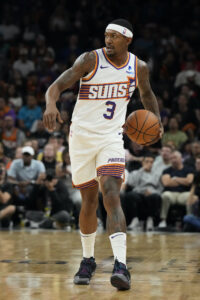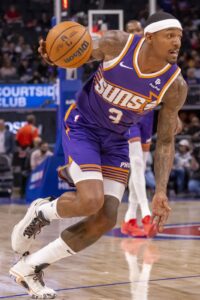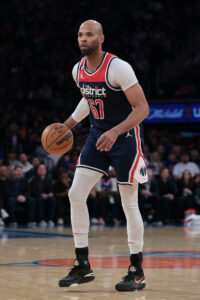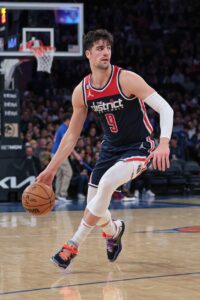This is the second entry in our series breaking down the significant trades of the 2023 offseason. As opposed to giving out grades, this series explores why the teams were motivated to make the moves. Let’s dive into a three-team blockbuster between the Suns, Wizards and Pacers…
On June 24:
 The Suns acquired Bradley Beal, Jordan Goodwin, and Isaiah Todd.
The Suns acquired Bradley Beal, Jordan Goodwin, and Isaiah Todd.- The Wizards acquired Chris Paul; Landry Shamet; the draft rights to Bilal Coulibaly (No. 7 pick); the Suns’ second-round picks in 2024, 2025, 2026, 2027, and 2030; first-round pick swaps in 2024, 2026, 2028, and 2030; and cash ($4.6MM; from Suns).
- The Pacers acquired the draft rights to Jarace Walker (No. 8 pick), the Suns’ 2028 second-round pick, and the Wizards’ 2029 second-round pick.
Notes:
- We won’t be covering the Wizards/Pacers part of this trade because it’s pretty straightforward: Washington gave up a couple second-rounders (one from Phoenix) to move up one spot in the draft, while Indiana got the player it wanted plus a couple assets.
- The Wizards will have the ability to swap their own first-round pick with the Suns’ first-rounder in 2024, 2026, and 2030. In 2028, the Wizards will have the ability to swap their own first-round pick with whichever one the Suns control (it could be the Suns’ own, the Nets’ first-rounder, or the Sixers’ first-rounder).
- The Wizards generated two traded player exceptions in the deal ($5,379,250 and $300,000 for Beal and Goodwin, respectively).
- Todd was later traded from Phoenix to Memphis and then waived by the Grizzlies.
The Wizards’ perspective:
Bradley Beal is the sixth-highest paid player in the league, only trailing former MVP winners Stephen Curry, Kevin Durant, Joel Embiid, LeBron James and Nikola Jokic. He will make $207.74MM over the next four seasons, including a $57MM+ player option in 2026/27.
The cost of Beal’s contract on its own would have made it difficult to recoup significantly positive value for the three-time All-Star, in part because he has appeared in just 90 of a possible 164 games over the past two seasons due to a variety of injuries. And for all his offensive skill, Beal has never been a great defender.
Complicating matters further for the Wizards was the fact that Beal is the only player in the entire NBA – and only the 10th in league history – to have a full no-trade clause. That gave Beal an enormous amount of power to choose not only his next destination, but the outgoing pieces that he would be traded for, since he could (and still can) veto any trade for whatever reason he wants.
It’s easy to say now (a lot of people were saying it at the time as well) that the Wizards should have extracted maximum value for Beal by trading him a few years ago, instead of waiting, keeping him, and giving him a pricey new contract with an inexplicable no-trade clause. But that isn’t what happened, and you can only play the cards you’re dealt.
I used that idiom in particular because new front office executives Michael Winger (president) and Will Dawkins (general manager) did not sign Beal. They just inherited his contract when they took over the basketball operations department.
Over the past five seasons, with Beal as the face of the franchise following major injuries to John Wall, the Wizards have gone 161-229, a 41.3 winning percentage. They posted a losing record each season, including going 35-47 the past two campaigns.
Obviously, not all of that is on Beal. He has been a very good player when healthy, despite his defensive shortcomings. But not good enough on his own to lift Washington into relevance.
The Wizards have been just mediocre enough to hurt their odds of landing a top draft pick while also being bad enough to always be in the lottery. Clearly, they needed a change of direction, and that had to start with moving Beal, who had been with Washington for all 11 of his NBA seasons.
I’m still a little surprised the Wizards got as much as they did from the Suns, even if it doesn’t look like an impressive haul at first glance. For example, the 2024 first-round pick swap is essentially worthless; there’s virtually no chance that Phoenix will be worse than Washington in ‘23/24.
Still, the Suns literally gave up every movable draft pick they controlled at the time, plus Paul, Shamet and cash.
Paul’s pseudo-expiring contract was later traded to Golden State for Jordan Poole, Patrick Baldwin, Ryan Rollins, a heavily protected 2030 first-round pick, a 2027 second-rounder and cash. We’ll dig deeper into that trade in a future article, but obviously it’s directly tied to this one, since Paul was the primary salary-matching piece for Beal.
In total: Poole, Baldwin, Rollins, Shamet, a top-20 protected first-rounder, four first-round swaps, seven second-round picks (one was sent to Indiana) and cash for Beal.
How Poole performs will ultimately go a long way to determining how valuable the return is, at least in the short term. He’s six years younger than Beal (24 vs. 30), will make $123MM+ over the next four years (instead of $207MM+) and doesn’t have a no-trade clause.
The 2030 pick swap has a chance to be very valuable, but only if the Wizards are better than Phoenix. It’s so far in the future that speculating about the possibility feels borderline pointless, though it’s worth noting that Kevin Durant will be 42 at that point.
Shamet is a decent player on a pseudo-expiring mid-sized contract — he’ll earn a guaranteed $10.25MM this season, but the final two years of his rookie scale extension are non-guaranteed. The 26-year-old has shot 38.8% from three-point range over his five-year career, which is valuable. When he’s on, he can make threes in bunches.
However, he doesn’t offer a whole lot else. It’s hard to say if he’ll be in Washington’s plans going forward, but his contract could be useful for trade purposes if he’s not.
Simply put, the Wizards needed to get younger, focus on player development, and rid themselves of Beal’s contract, which is arguably one of the worst deals in the NBA due to the no-trade clause — particularly for a team in no-man’s land. Washington accomplished all of those things, even if rebuilding is much easier in theory than it is practice.
The Suns’ perspective:
Clearly, new owner Mat Ishbia doesn’t care about spending money — the Suns added to their payroll (and luxury tax payment) by making this deal, both now and going forward. He just wants to win.
 Beal doesn’t need to be the face of the Suns. He doesn’t need to be the team’s best – or even second-best – player. The Suns just need him to be an immediate upgrade over 38-year-old Paul, who was a key reason Phoenix reached the Finals in 2021 and had the league’s best record in ‘22.
Beal doesn’t need to be the face of the Suns. He doesn’t need to be the team’s best – or even second-best – player. The Suns just need him to be an immediate upgrade over 38-year-old Paul, who was a key reason Phoenix reached the Finals in 2021 and had the league’s best record in ‘22.
The Suns were reportedly thinking about waiving Paul before they traded him in the package for Beal. While the future Hall of Famer was still effective last season, he has clearly lost a step on both ends, and remains a perennial injury concern. Turning a player you were contemplating cutting — plus other assets that may or may not be valuable — into an All-Star caliber player closer to his prime was a gamble worth taking for Phoenix.
It may seem like I’m not particularly high on Beal based on how I described things from Washington’s perspective. I certainly don’t think he’s the sixth-best player in the league, but that’s not really how contracts work.
Beal has had an interesting career trajectory. Early on he was primarily known as a jump shooter who would occasionally dabble in secondary play-making and driving. He wasn’t a great finisher in the paint and took far too many long twos, which hurt his efficiency.
For example, while Beal shot an impressive 39.7% from deep over his first four seasons, he only converted 44.0% of his twos and didn’t get to the line much, only posting a 52.1% true shooting percentage (for context, league average over that span was about 53.8%).
As with many talented scorers, Beal improved upon his weaknesses and became a much more dangerous and well-rounded offensive player from 2016 on, averaging 25.5 points, 5.0 assists, 4.3 rebounds and 1.2 steals with a 58.1 TS%. He posted above league average scoring efficiency in six of those seven seasons.
Interestingly, his three-point percentage has actually dropped pretty significantly over the past five seasons, which included his two 30-plus points per game campaigns from 2019-21. He has only converted 34.7% from long range over that span, and he has attempted progressively fewer threes as well.
Part of that is actually by design, and it’s also what makes Beal such a dangerous offensive player. He’s still treated like a sharpshooter who is chased off the line while coming off screens, but now he leverages that threat to get into the paint, make plays, draw fouls, and take short range jumpers, which he is very efficient at converting.
There isn’t really a great way to guard a player like Beal one-on-one. He’s a smooth ball-handler who uses hesitation dribbles to gain an advantage, and he’s adept at playing off the ball. He’s also a solid play-maker and passer, though he can be turnover prone at times.
The fact that Beal has been a No. 1 option for several years and is now a second or third option while still playing at basically the same level is kind of ridiculous. If Durant, Devin Booker and Beal are healthy, the Suns’ offense is going to be outrageously good, and it should be even better in the playoffs because of how versatile their stars are.
Another benefit for the Suns is if Booker or Durant are injured, they can just increase Beal’s usage and run more plays for him. He isn’t quite at the same level of either of those two, but he’s still a top-tier offensive player.
Goodwin shouldn’t be overlooked as part of this trade either. He was quite effective as a reserve last season for the Wizards. While he isn’t a great shooter, he’s an outstanding rebounder for his size (he’s 6’3” and averaged 6.7 rebounds per 36 minutes), is a solid play-maker who takes care of the ball, and is a terrific defender. He’s also on a bargain contract, another huge plus.
It’s very difficult to get quality production from minimum-salary free agents, and the Suns had arguably the best offseason in the NBA as far as that goes. I thought Eric Gordon, Drew Eubanks, Keita Bates-Diop and Yuta Watanabe all could have gotten at least the bi-annual exception or part of the mid-level exception. Phoenix also re-signed Josh Okogie at near the minimum — he got a slight raise using his non-Bird rights.
Some writers/analysts have questions about the Suns’ depth, but I actually think they have one of the deeper rosters in the league. They have plenty of solid players capable of complementing their star trio, and if a role player is having an off night, they can just insert another player in his spot.
The Suns completely overhauled their roster, plus they have a new coach, so you could argue chemistry will be an issue, particularly early on. But I don’t think there’s any doubt that they have a more talented and well-rounded team entering 2023/24 compared to the squad that ended ‘22/23.
- Out: Paul, Shamet, Deandre Ayton, Torrey Craig, Cameron Payne, Terrence Ross, Ish Wainright, Bismack Biyombo, Jock Landale, Darius Bazley, T.J. Warren.
- In: Beal, Goodwin, Gordon, Eubanks, Bates-Diop, Watanabe, Jusuf Nurkic, Nassir Little, Grayson Allen, Bol Bol, Chimezie Metu.
While Ross, Biyombo and Warren are all seasoned veterans, they remain free agents with the season starting today. Bazley signed a non-guaranteed deal with Brooklyn this summer but didn’t make the team. Wainright is now on a two-way deal with Portland after Phoenix waived him.
The biggest question mark for me with Phoenix isn’t depth, it’s health. Beal, Durant and Booker have all missed a significant chunk of time in recent seasons, and the Suns need all of them to be healthy in the playoffs (both Paul and Ayton were injured in the second round against Denver last season). Nurkic – a less critical piece of the puzzle — has also missed a ton of action over the past four seasons, but we’ll get more into that in a future article.
The fact that Beal (lower back) may not be available for Tuesday’s season opener against Golden State has to be a little discouraging, even if the team is likely just being cautious.
If things go really south in the next few years for whatever reason, worst-case scenario, the Suns could always trade Durant and/or Booker and retool the roster. If that were to occur, Beal would probably be happy to waive his no-trade clause again and be moved as well.
Still, there are lots of reasons for optimism for Phoenix. New head coach Frank Vogel has a well-deserved reputation as being a strong defensive coach, and there’s plenty of talent on that end for the Suns. If Beal can just be average or a little below, which is doable, they should be more than fine as far as that goes.
The Suns are on the short list of contenders this season. If they win, it would be their first championship in franchise history. Reshaping their roster on the fly was impressive, and a worthwhile risk – we’ll see if it pays off.
 The Suns acquired
The Suns acquired  Beal doesn’t need to be the face of the Suns. He doesn’t need to be the team’s best – or even second-best – player. The Suns just need him to be an immediate upgrade over 38-year-old Paul, who was a key reason Phoenix reached the Finals in 2021 and had the league’s best record in ‘22.
Beal doesn’t need to be the face of the Suns. He doesn’t need to be the team’s best – or even second-best – player. The Suns just need him to be an immediate upgrade over 38-year-old Paul, who was a key reason Phoenix reached the Finals in 2021 and had the league’s best record in ‘22. Washington faced a roster crunch this fall, with all 17 of their players on standard contracts owed fully guaranteed salaries in 2023/24. Neither Gibson nor Cooks projected to have a significant rotation role in D.C. and neither one was owed any guaranteed money beyond this season, making them logical candidates to be the odd men out.
Washington faced a roster crunch this fall, with all 17 of their players on standard contracts owed fully guaranteed salaries in 2023/24. Neither Gibson nor Cooks projected to have a significant rotation role in D.C. and neither one was owed any guaranteed money beyond this season, making them logical candidates to be the odd men out. “Deni has many of the characteristics that we value in the players who represent our organization. He has a team-first mentality, works hard on his craft, competes with toughness, and is committed to improving the community,” Wizards general manager Will Dawkins said in a statement. “That hard work has resulted in the year-to-year development of his overall game and we’re excited to have him continue that progress as a Wizard.”
“Deni has many of the characteristics that we value in the players who represent our organization. He has a team-first mentality, works hard on his craft, competes with toughness, and is committed to improving the community,” Wizards general manager Will Dawkins said in a statement. “That hard work has resulted in the year-to-year development of his overall game and we’re excited to have him continue that progress as a Wizard.”